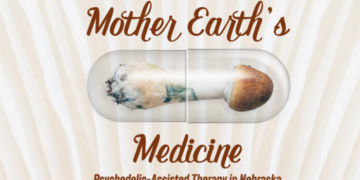Dr. Lydia Kang glanced at her ringing phone. It was her literary agent (who typically emailed). The unexpected phone call delivered some shocking news.
“We have a preemptive offer from Penguin,” the agent said.
Kang jumped up and down, silently screaming. “Yes, I’ll take the deal,” the physician recalls answering. Her writing career launched that day, Sept. 7, 2011, from her office at the University of Nebraska Medical Center’s Wittson Hall.
Her first young adult science fiction novel, Control, landed on bookstore shelves nearly two years after that pivotal phone call. The sequel, Catalyst, followed two years later.
Then…nothing. A three-year drought between book contracts. Kang tracked her queries, near misses, and request rates. Her diagnosis after dissecting the evidence? Wow. That’s a lot of rejection.
It was not the first setback in Kang’s literary career. She had sent other manuscripts to agents that were never picked up. She knew the harsh realities of the business. Like the title of her first book, authors can’t control what pitch will work.
“I don’t do well with sitting and doing nothing,” says Kang, a mother of three who writes in between her parenting obligations and her jobs as an internal medicine specialist and assistant professor at UNMC.
Luckily, Kang is a prolific researcher and fast writer. It wasn’t long before her author bylines continued to grow. Her next book was A Beautiful Poison (published in August 2017).
Kang also paired up with freelance journalist Nate Pedersen to try her hand at nonfiction with Quackery: A Brief History of the Worst Ways to Cure Everything. The book, released in October 2017, plunges into the darker history of medicine.
Need a cure for drowning? A smoke enema will do the trick to save someone from the brink of death. Ever hear the phrase, “blowing smoke up your ass?” Now you know it came from 18th-century medicine. Human blood was used for all sorts of ailments, such as fevers or hair loss. Readers can find a yummy blood jam recipe from 1679. Have achy joints? How about a little human fat harvested from a corpse?
Evident in many of Kang’s books, her medical background comes in handy when characters are injured or near death. “My writing life can take these characters to an exciting critical level because no lives are at stake,” she says.
She steered away from the macabre with November Girl, a work of literary fantasy, published a month after Quackery. It won the 2018 Nebraska Book Award for Best Young Adult Fiction.
Many of her ideas spring from falling down a Wiki rabbit hole searching for random information, sometimes on morbid topics like grave robbing. Medical schools needed fresh corpses to perform autopsies in the 1800s. Body snatchers, known as “resurrectionists,” received lucrative sums of money to dig up the remains of the recently departed.
Kang’s next book resurrected these gruesome fascinations in print. The work of historical fiction, The Impossible Girl, was published in fall 2018.
Protagonist Cora Lee sneaks into funerals during the day while stealing bodies of those with peculiar anomalies at night. The young lady has her own secret. She was born with two hearts and must keep one step ahead of those who want to murder her. The medical parts in the book, including Cora’s birth, are described as only a doctor could pen. Grisly details such as “the pool of bloody birth water staining the sheets” and “ignoring the black, muddy stool already staining the fabric” are realistic and vivid.
“You have to have a strong stomach for some things,” Kang admits.
She returned to her science fiction roots in Toxic, which came out in November. The protagonist, Hana, was secretly genetically engineered on a sentient biological spaceship. When the entire crew disappears, and as the ship dies, Hana must confront a team of mercenaries and her own blossoming romance.
Although busy with so many books, Kang has learned to balance her time. She still loves seeing patients at the Durham Outpatient Center. And writing is an artistic complement to the medical side of her life.
“[It] brings me so much incandescent happiness when I bring books to life. There is nothing like that,” she says.
Kang, 47, is currently piecing together a large map of 1899 Manhattan as research for her next book. Having attended Columbia University and the New York School of Medicine, she sets many of her stories in the city.
Her uncredited writing partner in all these projects is a black and white shih-poo named Piper, who loves laying down on her research materials. Kang hopes the dog doesn’t discover the maps.
This next book project was born from her research from Quackery. It is a dark tale about a drug-addicted heiress who unearths some vampire-like corpses. Tentatively titled Opium and Absinthe, the book is slated for 2020 publication.
Visit lydiakang.com for more information.
This article was printed in the January/February edition of Omaha Magazine. To receive the magazine, click here to subscribe.














